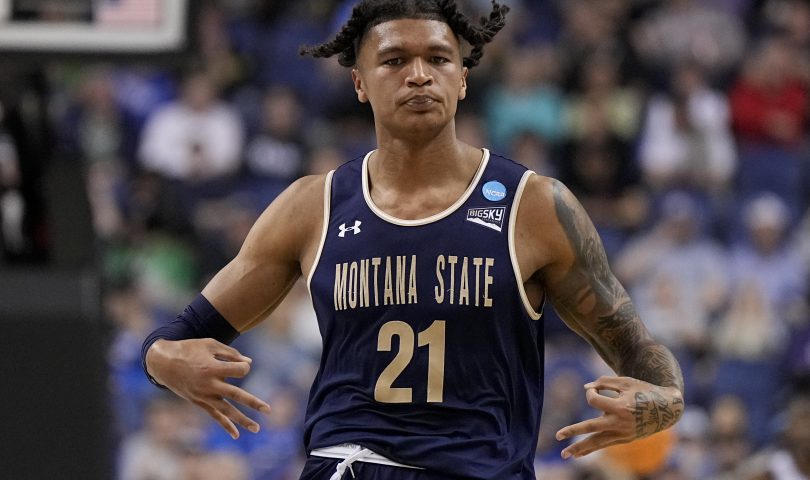MORGANTOWN — From inside a federal courthouse Wednesday in Wheeling, WVU men’s basketball guard RaeQuan Battle won, well, a major battle against the NCAA and its transfer rules.
It’s still to be determined if he’s won the war.
United States District Court Judge John P. Bailey issued a temporary restraining order (TRO) against the NCAA for 14 days in being able to enforce its transfer rules for college athletics.
In short, all college athletes across the country — including Battle and fellow WVU guard Noah Farrakhan — who are currently sitting out because of the transfer policy are immediately eligible to compete for the next two weeks.
The NCAA released a statement saying it would comply with the ruling and would notify its member schools that it would not enforce its transfer rules for the next 14 days.
Bailey also issued a two-week restraining order against the NCAA for enforcing its “Restitution Rule,” which would keep the NCAA from penalizing WVU, as well as other schools, from playing previously ineligible athletes during those 14 days.
Battle and Farrakhan could see action Saturday, when the Mountaineers (4-5) travel to Springfield, Mass. to play UMass in the Hall of Fame Classic.
They could also play in games against Radford and Toledo, before a full hearing on the restraining order is heard again in Wheeling.
The federal case, known as State of Ohio, et al vs. NCAA, alleges the NCAA’s transfer rule for college athletes violates antitrust law. West Virginia is one of seven states who joined the lawsuit.
“This order paves the way for student-athletes, like RaeQuan Battle, to play in the sport they love and continue improving themselves,” West Virginia Attorney General Patrick Morrisey said in a statement. “We are looking forward to proving definitively that the NCAA has violated the Sherman Act by failing to maintain a consistent and defensible transfer rule and by denying these student-athletes the chance to play.”
Battle is one of hundreds of college athletes sitting out across the nation, because he is a two-time transfer who has yet to earn a college degree.
The NCAA allows one free transfer, but earning immediate eligibility on a second transfer as an underclassmen requires a waiver.
WVU applied for one for Battle, but the request was denied by the NCAA. The appeal through the NCAA Committee for Legislative Relief was also denied.
Battle, along with Miami (Ohio) football player Maddox Kopp and Cincinnati men’s basketball Jamille Reynolds, testified during the hearing. Battle’s testimony lasted nearly 40 minutes.
“Nobody ever wants to transfer,” he said. “Nobody wants to do that. They want to stay at their institution and graduate and become a better player or whatever they want to do. Everyone is different, and I wanted (the NCAA) to look into this a little more and try to understand what their student-athletes are actually going through.”
Under cross examination by NCAA lawyers, Battle admitted he transferred a second time — from Montana State to WVU — because his head coach, Danny Sprinkle, had left the school to coach at Utah State.
The NCAA has said it wouldn’t sanction transfers for the reason of a coach leaving the school.
Battle, who turns 23 in Feb., also testified that he would rather use his final season of eligibility this season, even though he’s already sat out the first nine games.
WVU originally applied for an eligibility waiver for Battle under the NCAA’s mental health exception.
Battle, an American Indian who is a member of the Tulalip Tribe in Washington, has undergone much trauma is his life, including the recent death of a childhood friend to a drug overdose and a suicide by his cousin in 2013.
He was also related to the shooter, who took five lives, including himself, in the 2014 school shooting at Marysville-Pilchuck (Wash.) High.
Sprinkle, according to Battle’s testimony, had become more than a coach, but also his mental-health expert for the most part.
“My mental health counselor at Montana State was a student in training,” Battle said. “That’s why I didn’t know where I’d find a mental health counselor after coach Sprinkle left. I wasn’t very comfortable with my mental health counselor in the first place.”
He found a connection with WVU head coach Josh Eilert, who also spent time growing up as a kid on a reservation. Over the summer, Eilert visited the Tulalip Tribe, which is about 40 minutes north of Seattle.
The TRO covers the amount of time until a full hearing can be heard on Dec. 27.
The length of time for that hearing — hours or days — is not known but Battle also has a separate lawsuit filed against the NCAA that will be heard at the same time.
In Battle’s individual case, he is accusing the NCAA of limiting his Name, Image and Likeness (NIL) earnings by forcing him to sit out.





